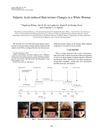 October 2023 in “Acta dermato-venereologica (Print)”
October 2023 in “Acta dermato-venereologica (Print)” People with severe hair loss have lower zinc levels in their blood.
16 citations,
May 2009 in “Journal of child neurology” Valproic acid does not change biotinidase enzyme activity in children's blood.
 April 2023 in “Journal of Investigative Dermatology”
April 2023 in “Journal of Investigative Dermatology” Cinchona succirubra extract with caffeine improves hair growth and reduces hair loss.
 February 2019 in “Trace elements and electrolytes”
February 2019 in “Trace elements and electrolytes” Women with chronic hair loss had lower levels of zinc, copper, and ferritin than healthy women.
 239 citations,
July 2002 in “Clinical and Experimental Dermatology”
239 citations,
July 2002 in “Clinical and Experimental Dermatology” Low iron and L-lysine levels can cause hair loss in women, and increasing these nutrients can reduce hair shedding.
 17 citations,
May 2018 in “Journal of Cosmetic Dermatology”
17 citations,
May 2018 in “Journal of Cosmetic Dermatology” Most women in the study lost hair due to chronic shedding, with stress and nutrient deficiencies being common factors.
 21 citations,
June 2011 in “Journal of child neurology”
21 citations,
June 2011 in “Journal of child neurology” Valproic acid and carbamazepine do not change biotin or biotinidase levels but may lower zinc levels, still within normal range.
 33 citations,
January 2017 in “Conservation physiology”
33 citations,
January 2017 in “Conservation physiology” Measuring reproductive hormones in brown bear hair could help identify their sex and reproductive state, but better collection methods or lab techniques are needed.
10 citations,
November 2019 in “Neuroendocrinology” Measuring 17-hydroxyprogesterone in hair can help monitor androgen levels in people with congenital adrenal hyperplasia.
3 citations,
May 2022 in “Clinical endocrinology” Hair steroid measurement is an effective method to diagnose and monitor CAH in developing countries.

Cinchona succirubra extract with caffeine reduces hair loss and strengthens hair.
 7 citations,
June 2021 in “Amino acids”
7 citations,
June 2021 in “Amino acids” Human hair protein modifications could potentially indicate heart disease risk.
 January 2017 in “Egyptian Journal of Dermatology and Venereology”
January 2017 in “Egyptian Journal of Dermatology and Venereology” Iron deficiency may contribute to chronic hair loss in premenopausal women.
22 citations,
May 1986 in “Clinics in endocrinology and metabolism” Certain finger length ratios and body hair patterns may predict side effects from birth control pills in women.
 127 citations,
March 2004 in “Gynecologic oncology”
127 citations,
March 2004 in “Gynecologic oncology” Taking selenium supplements during chemotherapy may help reduce side effects and improve health markers in ovarian cancer patients.
 February 2023 in “Global journal of health sciences and research”
February 2023 in “Global journal of health sciences and research” Zinc levels are not significantly linked to the presence or severity of alopecia areata.
 2 citations,
January 2017 in “Düşünen Adam”
2 citations,
January 2017 in “Düşünen Adam” Agomelatine might help stop hair loss caused by valproate.
 September 2018 in “International Journal of Dermatology”
September 2018 in “International Journal of Dermatology” People with alopecia areata often have lower levels of zinc and vitamin D.
 98 citations,
February 2007 in “Seminars in Cell & Developmental Biology”
98 citations,
February 2007 in “Seminars in Cell & Developmental Biology” Androgens can both stimulate and cause hair loss, and understanding their effects is key to treating hair disorders.
 79 citations,
January 2017 in “Dermatology practical & conceptual”
79 citations,
January 2017 in “Dermatology practical & conceptual” Correcting nutrient deficiencies may help with hair loss, but the benefits of supplements without a deficiency are uncertain and could be harmful.
 63 citations,
March 2000 in “Annals of clinical psychiatry”
63 citations,
March 2000 in “Annals of clinical psychiatry” Some psychiatric medications can cause hair loss, but it usually grows back after adjusting the medication.
 48 citations,
June 2013 in “Journal of Dermatological Science”
48 citations,
June 2013 in “Journal of Dermatological Science” Valproic acid may help hair grow and could be a safe treatment for hair loss.
 37 citations,
February 2014 in “Journal of Dermatology”
37 citations,
February 2014 in “Journal of Dermatology” Valproic acid increases hair count in men with hair loss.
 18 citations,
April 2013 in “Inflammatory Bowel Diseases”
18 citations,
April 2013 in “Inflammatory Bowel Diseases” People with Inflammatory Bowel Disease often lose hair due to stress, medication side effects, or lack of nutrients, and treatment depends on the specific cause.
 13 citations,
November 2013 in “Seizure: European Journal of Epilepsy”
13 citations,
November 2013 in “Seizure: European Journal of Epilepsy” Levetiracetam may cause hair loss, which can potentially reverse with lower doses or stopping the drug.
 13 citations,
January 2007 in “Epilepsia”
13 citations,
January 2007 in “Epilepsia” Valproic acid can cause reversible hair curling and persistent hair thinning.

Topical valproate can effectively promote hair growth.
 1 citations,
December 2010 in “InnovAiT”
1 citations,
December 2010 in “InnovAiT” The document concludes that accurate diagnosis and appropriate management are crucial for treating various hair disorders, which have significant psychological impacts.
 17 citations,
July 2003 in “Metabolism-clinical and Experimental”
17 citations,
July 2003 in “Metabolism-clinical and Experimental” Women with female-pattern baldness produce more testosterone, but 5a-reductase inhibition treatment won't help.

Iron and zinc deficiencies may be treated to help female hair loss.


























